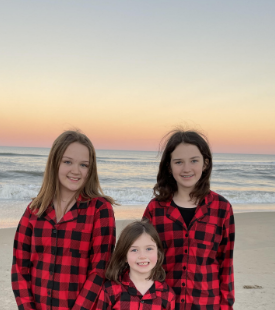Warhawks celebrate December holidays with unique traditions

Kathleen Morrow (’25) and her siblings wear matching Christmas pajamas
January 10, 2023
Many await the cheer that comes with the annual return of the holiday season. People enjoy this festive time of year because it is a time of giving, community and celebration. Around the globe, there are hundreds of traditions that take place around the December time frame, each with a unique and rich culture.
The most widely celebrated holiday, with 93% of Americans indulging in festivities, is Christmas. Christmas culture is widespread throughout the nation. Lights, Christmas and seasonal flavors along with festive music are seen starting the day after Halloween. The holiday is a festival celebrating the birth of Jesus, falling on Dec. 25.
People who celebrate find joy in their Christmas activities.
“I enjoy spending time with the people I love during the season,” Samantha Stemp (’25) said. “On Christmas morning I open presents with my family. We watch a Christmas movie while we eat breakfast.”
Others in the Madison community have annual Christmas traditions.
“My family and I always open one gift the night before Christmas,” Kathleen Morrow (’25) said. “In the weeks leading up to Christmas, we do a Christmas countdown. A couple of years ago, my mom found a list of things to do every day in December. My favorite activities on the countdown are baking cookies, going holiday shopping and seeing Christmas lights. I have fun giving gifts and spending time with my friends and family.”
People often overlook the many holidays that are celebrated beyond Christmas during the season.
One of these holidays is Hanukkah, a Jewish celebration taking place from Dec. 18-26 this year. The festival is to commemorate the rededication of the Second Temple. Hanukkah celebrates the victory of the Maccabees over the Syrians in 164 BCE. The holiday is often called the Festival of Lights, the Feast of the Maccabees and the Feast of Dedication.
The custom of lighting candles originates from the “miracle of the oil” in the temple, when oil that was only sufficient for one day burned for eight. During the eight evenings of Hanukkah, the nightly occasion is to light the menorah, a candelabra with eight branches and holder for the shammash (servant) candle.
While Hanukkah is a significant Jewish tradition, it is more popular in America than anywhere else in the world.
“Fun fact: in Israel, Hanukkah isn’t a big holiday at all,” Rachel Neuman (’25) said. “The three main Jewish Holidays are Passover, Rosh Hashanah and Yom Kippur. Supposedly, the reason as to why Hanukkah is such a big holiday for American Jews is because of its timing and relation to Christmas. A lot of Jewish parents and kids felt left out of the abundance of festivities and presents that other kids would get for Christmas, so they gave way for Hanukkah to be just as significant to them.”
Common Jewish customs during Hanukkah are playing dreidel, eating latkes, giving gifts and listening to festive music. For millions of people, these days are full of joy and celebration for the miracle.
“It [Hanukkah] has provided really nice moments to bond with your family,” Neuman said. “Especially in my family, everyone is so busy with their own lives sometimes we never see each other in a day, so it’s nice to have a gathering of festivities.”
One more holiday that takes place, which is celebrated in the United States as well as some parts of the Caribbean and Canada, is Kwanzaa. Kwanzaa is based on Western and Southeastern African harvest festival traditions, and its name is derived from a Swahili phrase meaning “first fruits of the harvest.” It is celebrated from Dec. 26 through Jan. 1 and is observed by African Americans. It was created in the 1960s by Maulana Karenga, a black activist and nationalist, who saw importance in unifying the African American community.
On the sixth day of the festival, partakers have the Karamu, which is a communal feast. The holiday of Kwanzaa is a celebration of African American life, heritage and community. Kwanzaa reaffirms the meaning and practices of African culture.
Overall, these early winter holidays bring excitement and cheer throughout the Madison community, and there are many things to celebrate and recognize this season.


